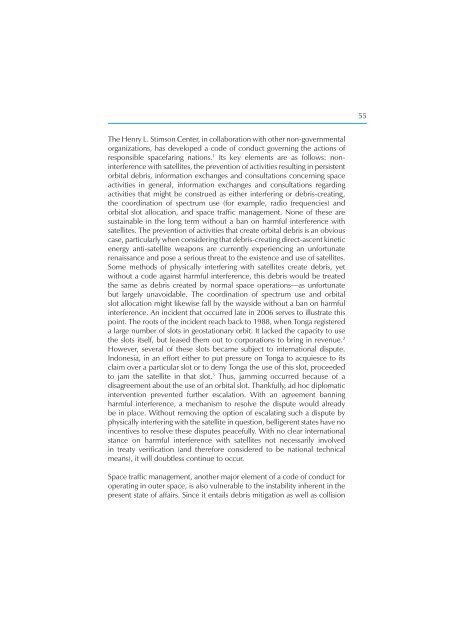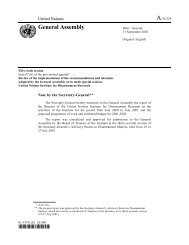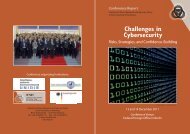Security in Space The Next Generation - UNIDIR
Security in Space The Next Generation - UNIDIR
Security in Space The Next Generation - UNIDIR
You also want an ePaper? Increase the reach of your titles
YUMPU automatically turns print PDFs into web optimized ePapers that Google loves.
<strong>The</strong> Henry L. Stimson Center, <strong>in</strong> collaboration with other non-governmental<br />
organizations, has developed a code of conduct govern<strong>in</strong>g the actions of<br />
responsible spacefar<strong>in</strong>g nations. 1 Its key elements are as follows: non<strong>in</strong>terference<br />
with satellites, the prevention of activities result<strong>in</strong>g <strong>in</strong> persistent<br />
orbital debris, <strong>in</strong>formation exchanges and consultations concern<strong>in</strong>g space<br />
activities <strong>in</strong> general, <strong>in</strong>formation exchanges and consultations regard<strong>in</strong>g<br />
activities that might be construed as either <strong>in</strong>terfer<strong>in</strong>g or debris-creat<strong>in</strong>g,<br />
the coord<strong>in</strong>ation of spectrum use (for example, radio frequencies) and<br />
orbital slot allocation, and space traffi c management. None of these are<br />
susta<strong>in</strong>able <strong>in</strong> the long term without a ban on harmful <strong>in</strong>terference with<br />
satellites. <strong>The</strong> prevention of activities that create orbital debris is an obvious<br />
case, particularly when consider<strong>in</strong>g that debris-creat<strong>in</strong>g direct-ascent k<strong>in</strong>etic<br />
energy anti-satellite weapons are currently experienc<strong>in</strong>g an unfortunate<br />
renaissance and pose a serious threat to the existence and use of satellites.<br />
Some methods of physically <strong>in</strong>terfer<strong>in</strong>g with satellites create debris, yet<br />
without a code aga<strong>in</strong>st harmful <strong>in</strong>terference, this debris would be treated<br />
the same as debris created by normal space operations—as unfortunate<br />
but largely unavoidable. <strong>The</strong> coord<strong>in</strong>ation of spectrum use and orbital<br />
slot allocation might likewise fall by the wayside without a ban on harmful<br />
<strong>in</strong>terference. An <strong>in</strong>cident that occurred late <strong>in</strong> 2006 serves to illustrate this<br />
po<strong>in</strong>t. <strong>The</strong> roots of the <strong>in</strong>cident reach back to 1988, when Tonga registered<br />
a large number of slots <strong>in</strong> geostationary orbit. It lacked the capacity to use<br />
the slots itself, but leased them out to corporations to br<strong>in</strong>g <strong>in</strong> revenue. 2<br />
However, several of these slots became subject to <strong>in</strong>ternational dispute.<br />
Indonesia, <strong>in</strong> an effort either to put pressure on Tonga to acquiesce to its<br />
claim over a particular slot or to deny Tonga the use of this slot, proceeded<br />
to jam the satellite <strong>in</strong> that slot. 3 Thus, jamm<strong>in</strong>g occurred because of a<br />
disagreement about the use of an orbital slot. Thankfully, ad hoc diplomatic<br />
<strong>in</strong>tervention prevented further escalation. With an agreement bann<strong>in</strong>g<br />
harmful <strong>in</strong>terference, a mechanism to resolve the dispute would already<br />
be <strong>in</strong> place. Without remov<strong>in</strong>g the option of escalat<strong>in</strong>g such a dispute by<br />
physically <strong>in</strong>terfer<strong>in</strong>g with the satellite <strong>in</strong> question, belligerent states have no<br />
<strong>in</strong>centives to resolve these disputes peacefully. With no clear <strong>in</strong>ternational<br />
stance on harmful <strong>in</strong>terference with satellites not necessarily <strong>in</strong>volved<br />
<strong>in</strong> treaty verifi cation (and therefore considered to be national technical<br />
means), it will doubtless cont<strong>in</strong>ue to occur.<br />
<strong>Space</strong> traffi c management, another major element of a code of conduct for<br />
operat<strong>in</strong>g <strong>in</strong> outer space, is also vulnerable to the <strong>in</strong>stability <strong>in</strong>herent <strong>in</strong> the<br />
present state of affairs. S<strong>in</strong>ce it entails debris mitigation as well as collision<br />
55








